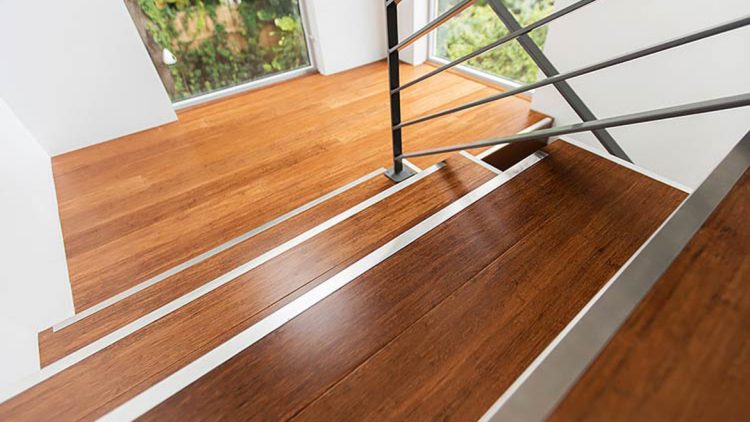Bamboo Flooring Frequently Asked Questions
1. What is bamboo flooring?
Bamboo flooring is a type of flooring made from the bamboo plant. It is known for its durability, eco-friendliness, and natural aesthetic. Bamboo is technically a grass but is processed to create flooring that resembles traditional hardwood.
2. Is bamboo flooring durable?
Yes, bamboo flooring is generally very durable. Strand-woven bamboo flooring is especially known for its hardness and resistance to wear and tear. It can be harder than some hardwoods like oak and maple.
3. How does bamboo flooring compare to hardwood?
Bamboo flooring is comparable to hardwood in many ways, including appearance and durability. However, bamboo is often more eco-friendly because it grows much faster than trees. Bamboo can be harvested every 3-5 years, whereas hardwood trees take decades to mature.
4. Is bamboo flooring eco-friendly?
Yes, bamboo is considered an eco-friendly flooring option. Bamboo plants grow rapidly and can be harvested sustainably. However, it’s important to choose bamboo products that are manufactured using environmentally friendly processes and adhesives.
5. What are the different types of bamboo flooring?
There are three main types of bamboo flooring:
- Horizontal: Bamboo strips are placed horizontally, showing the natural growth rings and bamboo nodes.
- Vertical: Bamboo strips are placed vertically, creating a uniform and linear appearance.
- Strand-Woven: Bamboo fibers are woven together and compressed under high pressure, resulting in a very hard and durable flooring option.
6. Can bamboo flooring be refinished?
Most bamboo flooring can be refinished, but it depends on the thickness of the bamboo layer. Strand-woven bamboo is typically harder to refinish due to its density. Always check with the manufacturer for specific refinishing guidelines.
7. Is bamboo flooring waterproof?
Bamboo flooring is not completely waterproof, but it is more water-resistant than many hardwoods. Spills should be cleaned up promptly to prevent damage. Excessive moisture or standing water can cause the flooring to warp or swell.
8. How do you clean and maintain bamboo flooring?
Cleaning bamboo flooring is straightforward:
- Sweep or vacuum regularly to remove dirt and debris.
- Use a damp mop with a pH-neutral cleaner specifically designed for bamboo or hardwood flooring.
- Avoid using excessive water, harsh chemicals, or abrasive cleaning tools.
9. Can bamboo flooring be installed in any room?
Bamboo flooring is versatile but is not recommended for high-moisture areas like bathrooms or basements. It performs well in living rooms, bedrooms, and kitchens with proper care.
10. How is bamboo flooring installed?
Bamboo flooring can be installed using several methods:
- Nail-down: Fastening the planks to a subfloor using nails.
- Glue-down: Adhering the planks to a subfloor with adhesive.
- Floating: Planks are clicked or locked together and “float” over an underlayment without being attached to the subfloor.
11. Is bamboo flooring safe for pets?
Bamboo flooring is generally pet-friendly. It is harder than many hardwoods, making it resistant to scratches and dents caused by pet claws. However, it’s still advisable to keep pet nails trimmed and clean up any accidents immediately.
12. What are the cost considerations for bamboo flooring?
Bamboo flooring prices vary depending on the type and quality. On average, you can expect to pay between $3 to $9 per square foot for materials. Installation costs can range from $4 to $8 per square foot. Overall, bamboo flooring can be a cost-effective alternative to traditional hardwood.
13. Does bamboo flooring change color over time?
Like many natural materials, bamboo flooring can change color over time due to exposure to sunlight. Strand-woven bamboo is less prone to color change compared to horizontal or vertical bamboo.
14. Are there any health concerns with bamboo flooring?
Bamboo flooring is generally safe, but it’s important to choose products with low-VOC (Volatile Organic Compound) finishes and adhesives to minimize indoor air quality concerns. Look for certifications like FloorScore or GREENGUARD to ensure low emissions.
15. Can bamboo flooring be installed over radiant heating systems?
Yes, bamboo flooring can be installed over radiant heating systems. However, it’s essential to follow the manufacturer’s guidelines and ensure proper installation to avoid any potential issues related to expansion and contraction due to temperature changes.
By addressing these frequently asked questions, you can gain a better understanding of bamboo flooring and make an informed decision if it’s the right choice for your home.
Urban Customs Installs Hardwood Flooring In Phoenix, Arizona
At Urban Customs we offer all types of flooring installation in Phoenix, Arizona, including Wood flooring, stone flooring, and bamboo flooring. Request a free flooring installation quote from Urban Customs today! Our address is 8050 N 19th Ave #127, Phoenix, AZ 85021.[/vc_column_text][/vc_column][/vc_row]


